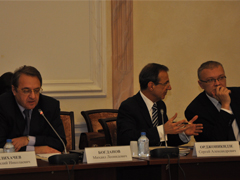13.12.2012
 «The situation in the Near and Middle East is of strategic importance for Russia both in terms of national security and foreign policy interests, and in terms of the development of economic cooperation with the states of this region. Over several decades Russia has formed good-neighborly, often friendly relations with many of the Middle Eastern countries,” said Sergei Ordzhonikidze, a member of the Russian Public Chamber, opening a meeting of the Russian Public Council for International Cooperation and Public Diplomacy “The Crisis in the Middle East and North Africa and Russia’s National Interests».
«The situation in the Near and Middle East is of strategic importance for Russia both in terms of national security and foreign policy interests, and in terms of the development of economic cooperation with the states of this region. Over several decades Russia has formed good-neighborly, often friendly relations with many of the Middle Eastern countries,” said Sergei Ordzhonikidze, a member of the Russian Public Chamber, opening a meeting of the Russian Public Council for International Cooperation and Public Diplomacy “The Crisis in the Middle East and North Africa and Russia’s National Interests».
“Nevertheless, Russia’s special role in the Near and Middle East does not suit everyone – a number of influential regional and extra-regional players are interested in a significant weakening of Moscow’s military-political and economic positions,” Ordzhonikidze noted.
“The events in Tunisia, Libya, Egypt, Yemen and Syria can be assessed as the beginning of a new stage in the development of the Arab East as a whole. A long era, the beginning of which was marked by anti-colonial and anti-monarchy revolutions, as a result of which young reformers came to power, is coming to an end,” said Sergei Ordzhonikidze.
“We have told our Western and Arab partners that further work should be based on the Geneva communiqué. We should support the mission of Lakhdar Brahimi as a special representative of the UN and the LAS. “In our opinion, it was necessary to involve the format of the ‘action group’ as well,” said Mikhail Bogdanov, deputy head of the Russian Foreign Ministry.
“The Report “Transformation Processes in the Middle East and North Africa and Russia’s National Interests,” sent to all the participants of our meeting, provides a detailed analysis of the specifics of the situation in different countries of this regional subsystem. I would like to dwell separately on the most difficult issue – the situation in the Syrian Arab Republic,” continued the Chairman of the Russian Public Council for International Cooperation and Public Diplomacy Sergey Ordzhonikidze.
“Russia needs to proceed from the principle of freedom of the Syrian people to determine their own fate and the fate of their country as a sovereign, united and independent state without external interference and attempts to impose ready-made recipes of socio-political development. It should be understood that this position was consolidated following the tripartite meeting in Geneva with the participation of the Special Representative of the President of the Russian Federation for the Middle East and Deputy Minister for Foreign Affairs, Mikhail Leonidovich Bogdanov, who was present here. Interference in the process of reforming Syria’s political system from the outside is completely unacceptable. At the same time, the settlement process in the country should be based on the establishment of a national dialogue,” says the OP member.
“As a result of these events, the number of countries that have traditionally belonged to the number of Russian partners and allies has decreased significantly. In order to restore and strengthen this influence, Russia needs to take measures to restore its influence in the field of security, economy, investments, humanitarian contacts, formation of pro-Russian lobbying groups and develop non-traditional, innovative tools to spread this influence,” concluded Sergei Ordzhonikidze.
Press Service of the Public Chamber of the Russian Federation
